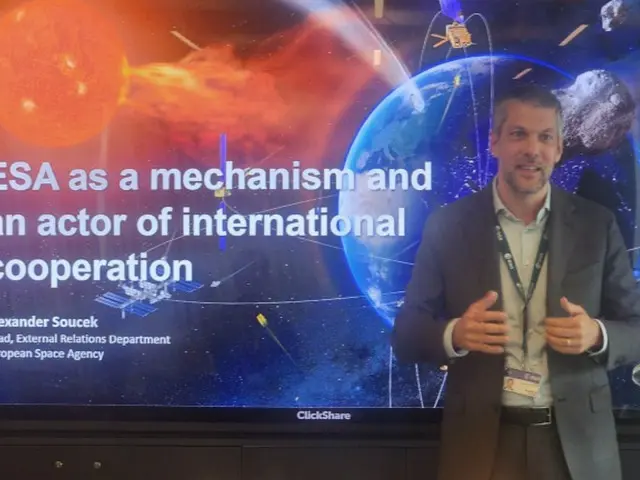Alexander Sussek, European Space Agency (ESA) international cooperation officer, said this on the 7th of this month (local time) at ESA headquarters in Paris, France.
With the US NASA facing budget cuts and the environment for international cooperation worsening due to the Russia-Ukraine war, space cooperation between South Korea and Europe is drawing attention as a new breakthrough.
This is particularly significant in that it has the potential to transform what has so far been sporadic cooperation and temporary exchanges between individual researchers into systematic cooperation based on formal agreements.
Local aerospace experts I met in Paris and Toulouse, France, also said, “Now is the perfect time to expand space cooperation between Korea and Europe,” and “We need the highest level of people needed by industry and academia.”
"By cultivating talented people and actively engaging in international exchanges, Korea can secure more opportunities on the global space industry stage."
European experts have focused on the role of the Korean Space Agency and satellite navigation system.
We hope to expand opportunities for exchange in areas such as basic research in physics and research into the effects of the sun. Of course, cooperation between Korea and ESA is still in its early stages, and Canada's
Since Korea is not an associate member of the ESA, it is necessary for the Space Agency to continue to develop its relationship with ESA. Alexander Susek said, "Korea is not biased towards a specific field, but has strong diversity.
"Last month, all 23 ESA member states unanimously agreed to cooperate with Korea, and we hope to develop our relationship in the long term as we flesh out our cooperation program," he said.
The French aerospace capital Toulouse is home to two Grandes Ecoles (elite training institutions), the National School of Aeronautics (ENAC) and the National School of Aeronautics and Space (ISTA).
SAE-Superior officials also emphasized the importance of focusing on practical matters and cultivating elite talent.
Professor Emmanuel Janou from ISAE-Supaero and Marc Choupo from ENAC
Professor Lee emphasized that it is necessary to produce talent from prestigious universities such as KAIST and Seoul National University, or talent specialized in practical matters like Hanseo University, and that such talent would be open to exchange.
He suggested that it would be difficult to have temporary cooperation at the local government level or to have exchanges with low-level schools, and that the nature of the exchanges must be mutually beneficial.
In fact, Hanseo University and KAIST run exchange student programs with ENAC and ISAE-Supaero, respectively.
Exchanges with Seoul University are also being promoted. Projects are being carried out in close collaboration with the French National Space Center (CNES), the European Space Agency (ESA), and private companies.
They said, "We have received many collaboration proposals from Korean universities, and among these, we are satisfied with our collaboration with KAIST and are also in exchange with Hanseo University."
"Opportunities are open, but they may vary depending on the characteristics of the cooperating institution. Korea needs to develop specialized human resources, human resources that work closely with the industry," he advised.
2025/07/17 10:03 KST
Copyrights(C) Edaily wowkorea.jp 88

